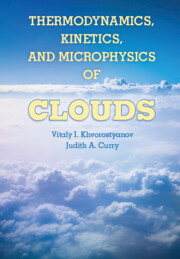Book contents
- Frontmatter
- Contents
- Preface
- 1 Introduction
- 2 Clouds and Their Properties
- 3 Thermodynamic Relations
- 4 Properties of Water and Aqueous Solutions
- 5 Diffusion and Coagulation Growth of Drops and Crystals
- 6 Wet Aerosol Processes
- 7 Activation of Cloud Condensation Nuclei into Cloud Drops
- 8 Homogeneous Nucleation
- 9 Heterogeneous Nucleation of Drops and Ice Crystals
- 10 Parameterizations of Heterogeneous Ice Nucleation
- 11. Deliquescence and Efflorescence in Atmospheric Aerosols
- 12 Terminal Velocities of Drops and Crystals
- 13 Broad Size Spectra in Clouds and the Theory of Stochastic Condensation
- 14 Analytical Solutions to the Stochastic Kinetic Equation for Precipitating Clouds
- References
- Notations
- Index
Preface
Published online by Cambridge University Press: 05 September 2014
- Frontmatter
- Contents
- Preface
- 1 Introduction
- 2 Clouds and Their Properties
- 3 Thermodynamic Relations
- 4 Properties of Water and Aqueous Solutions
- 5 Diffusion and Coagulation Growth of Drops and Crystals
- 6 Wet Aerosol Processes
- 7 Activation of Cloud Condensation Nuclei into Cloud Drops
- 8 Homogeneous Nucleation
- 9 Heterogeneous Nucleation of Drops and Ice Crystals
- 10 Parameterizations of Heterogeneous Ice Nucleation
- 11. Deliquescence and Efflorescence in Atmospheric Aerosols
- 12 Terminal Velocities of Drops and Crystals
- 13 Broad Size Spectra in Clouds and the Theory of Stochastic Condensation
- 14 Analytical Solutions to the Stochastic Kinetic Equation for Precipitating Clouds
- References
- Notations
- Index
Summary
Cloud microphysics is a branch of cloud physics that studies initiation, growth, and dissipation of cloud and precipitation particles. Cloud microphysics is governed by the thermodynamic and kinetic processes in clouds. The field of cloud microphysics has been intensively developed since the 1940s when the first successful experiments on cloud seeding were performed. The field has received additional impetus in recent years from the challenges associated with forecasting precipitation and understanding aerosol-cloud interactions in the context of climate change and feedback processes. Several books on cloud microphysics are available, including Mason (1957), Fletcher (1962, 1970a), Dufour and Defay (1963), Sedunov (1974), Voloshchuk and Sedunov (1975), Voloshchuk (1984), Matveev (1984), Young (1993), Pruppacher and Klett (1997), and Cotton et al. (2011).
The Thermodynamics, Kinetics, and Microphysics of Clouds extends the subject of cloud microphysics beyond these previous treatments. The goals and contents of this book are formulated to:
Present in compact form the major thermodynamic relations and kinetic equations required for theoretical consideration of cloud microphysics;
Review the currently known states of water in liquid, crystalline, and amorphous forms, and the conceptual modern theories of water and equations of state for water in various states;
Formulate a closed system of equations that describe the kinetics of cloud microphysical processes and is suitable both for analytical studies and for inclusion in numerical models;
Derive from theory generalized analytical parameterizations for aerosol deliquescence, hygroscopic growth, efflorescence, and drop activation and ice nucleation in various modes;
Demonstrate that these theoretical parameterizations generalize and unify previous parameterizations and include them as particular cases; express previous empirical parameters via atmospheric and aerosol parameters and theoretical quantities;
Derive the kinetic equations of stochastic condensation and coagulation and obtain their analytical solutions that reproduce the observed drop and crystal size spectra; express parameters of empirical distributions from theory; and
Outline a path for future generalizations of the kinetic equations of cloud microphysics based on the Chapman–Kolmogorov and Fokker–Planck equations.
- Type
- Chapter
- Information
- Thermodynamics, Kinetics, and Microphysics of Clouds , pp. xv - xviiiPublisher: Cambridge University PressPrint publication year: 2014



